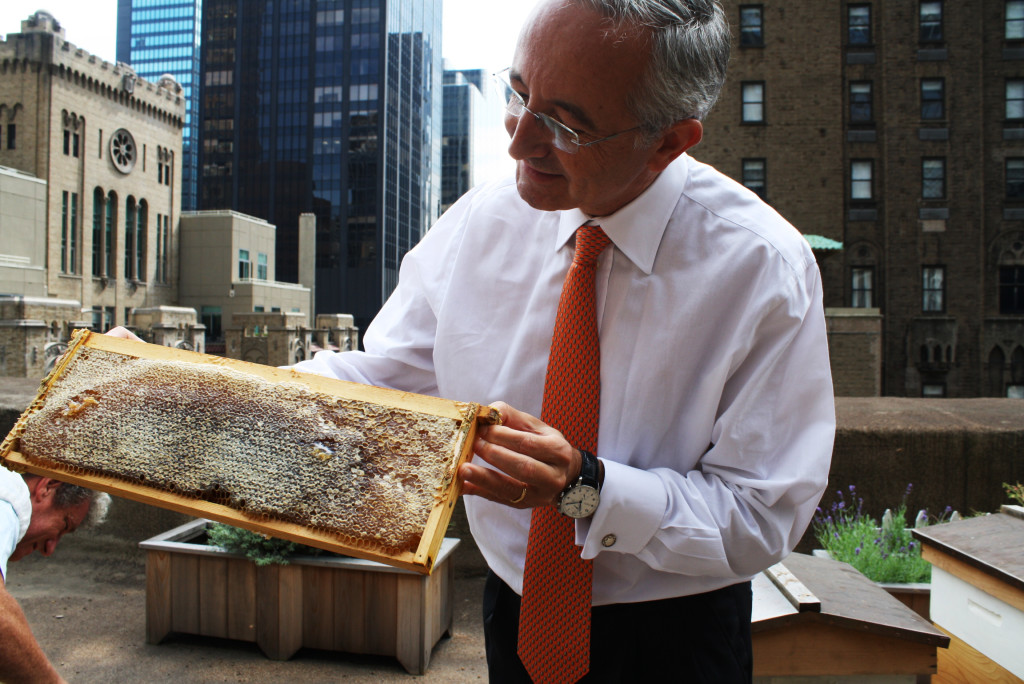Hervé Houdré is the Regional Director of Operations of the InterContinental Hotel Group (IHG) and General Manager of the landmark InterContinental New York Barclay, now closed for major renovation. As an award-winning luminary on integrating sustainability into large, luxury, urban hotels, Houdré is considered one of New York City’s greenest hoteliers and was instrumental in making the InterContinental Barclay an industry leader in responsible hospitality.
Widely published on sustainable hospitality, Houdré is chairman of the Hotel Association of New York City’s (HANYC) Sustainable Hospitality Committee, which recently announced the winners of its first Sustainability Awards, part of an effort to move New York City hotels toward a more sustainable future.
Hotelier International: Why do you believe hotels should think about sustainability?
Hervé Houdré: Sustainability is about the triple bottom line – profit, people, planet. It’s about making money while taking care of the environment and the communities surrounding us. Hotels use lots of energy. Hotels create lots of waste – our own as well as what we collect from customers. Mitigating our very big carbon footprint is the “planet” part. For the “people” part, we also depend a lot on local communities, so it’s fitting to be socially responsible and give back. And, obviously, we have
to deliver “profit” to be sustainable financially.
HI: How has IHG taken sustainability to heart?
HH: IHG has Responsible Business as one of its four strategic objectives. It means we’re here to do business, but must embed the principles of sustainability in everything. Our internal sustainability certification, called GreenEngage, has 150 key indicators. Most other hotel management
companies have also incorporated sustainability.
HI: Has it been easy to push internally for sustainability?
HH: The biggest issue is one of financial return on investment. The owners – and the financial world – don’t always see sustainability as a way to increase profit. I’m not blaming them. I think it’s up to us, the operators, to show them the value in being sustainable, even when we simply tackle the low-hanging fruit.
HI: What is some of the low-hanging fruit?
HH: Bulbs! In 2006, we changed to energy-efficient bulbs at the Willard InterContinental Washington. We saved $120,000 and it cost only $45,000. That’s the savings every year against a one-time cost. At the Barclay, after changing bulbs and being as energy efficient as possible since 2009, in 2013 we saved $400,000 in electricity cost versus 2009 expenditures with the same occupancy. We saved $900,000 in five years. A huge return on investment!
HI: Are there other initiative?
HH: To be sustainable doesn’t mean spending lots of money. It’s opening your eyes and doing the right thing. At the Barclay, a rooftop garden grew herbs, cherry tomatoes, and peppers used by the chef and mixologist. We also have beehives, which was copied by other hotels. We wanted to show our concern about the city’s biodiversity and ecosystem. Breakfasts were based on organic, sustainable, and seasonal food, which was good for people’s health, the environment, and local farmers and producers. We donated whatever we couldn’t use to City Harvest. We were the first hotel to have an Enviro composter to convert organic waste to topsoil. The machine managed 40 percent on site, while the rest was sent away for processing. We sent all used amenities to Clean the World, which processes it into soap bars for use in Africa. Of course, there were low- flow showers and toilets, 100 percent biodegradable keycards, and we purchased renewable energy credits to show our commitment to renewable energy.
These are little things! You can go into bigger things like cogeneration and micro-turbines. We are always trying to find new ideas. It’s non-stop.
HI: What would you counsel other hoteliers to do when grappling with sustainability?
HH: Go through a sustainable certification process. If you have no clue what you should be doing, it’ll give you ideas. I recommend Green Key Global (there are others like Green Globe and EarthCheck) because it’s good return on investment. It’s not very expensive and even offers a great roadmap to follow. Certifications are also marketing tools that draw attention.
HI: How has your work with HANYC’s Sustainable Hospitality Committee helped drive the sustainability agenda in New York City?
HH: We created this committee four years ago because we are concerned
about being good citizens. One of our initiatives was to create a sustainable hospitality website. Another was to establish Sustainability Awards, given last year for the first time.
HI: How can we make the move to sustainability a speedier and more urgent process?
HH: Unfortunately, at the nation-state level, we don’t seem to get along. Because governments can’t really settle, it’s up to businesses to make a big stride. This is why, when it comes to the hotel industry, I’m trying to do as much as I can to influence it in the best way possible.


